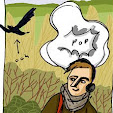We have this ongoing problem (hardly unique) that we need to be able to locate (positive) activities in time and space somewhere where young people already are. Such a quest inevitably leads you to Facebook. However, Facebook's events system, kept clunky and timeconsuming to flummox spammers, is not suited to the large lists produced by a government directive to provide all young people with two hours of directed positive leisure activity a week. There are apps which can enable this (meet the Boredometer, for example) but then there's the question of uptake, maintenance, development, etc.
Also, and more broadly, there's the question of whether Facebook is currently being used primarily to organise leisure time. After the redesign dropped events to a less prominent position on the page, I stopped using it so much to figure out what I might be doing this weekend. I'm now far more chatting and interacting with (geographically) distant friends and frelatives. I've seen this before, on other sites. It starts out as a place to organise parties, pub nights and gigs, and then it suffers social erosion, eventually becoming a place where you chat/interact with the friends you met there and those of your friends who successfully adopted. One of my new year's resolutions, I kid not, is "map existing social groups and identify reliable communication routes for all". All too soon, your tool for better organisation of social groups is muddy with natter, farming games, quizzes, memes and people throwing sheep and kinder eggs around -- and while you can hide that interaction, what you can't do is get back the attention it has taken away. The inbox is full, and your personal interaction has been crowded out by commercial cuckoos.
One approach to this degradation of social channels is to find/create a popular SN site that is built entirely around events. I spotted Upcoming, one of the elder statespeople on the scene, in a complaint in a friend's twitter stream only the other day. It never quite stretched beyond a certain audience, though, and a glance at what's on it in the Oxford area hints at why: e-campaigning forum, geek night, geek jam, xml summer school, e-chem-info, psychoanalysis... the bar for participation rests high. No gigs and parties here.
But that did spark me to start looking around. Meetup has folksy charm and a lot of actual users, even in this smallish city. I put an ID in it and marked it as a project for a rainy day. At least a few things I can obviously do there, and do I like to contribute. But it's not for work; this is a grown-up space. Then a link and a mention sent me off in the direction of something called Foursquare.
Foursquare doesn't look like it's aimed at grown-ups. It doesn't even really look like it's built by grown-ups. The mobile interface is flaky, it keeps going down and the information on it -- well, with the bar set that low, some of it's going to be bogus. I'm not quite sure why even I'm persisting with it, except that if it wasn't giving me something I wanted I wouldn't be annoyed with its shortcomings. I'd just have left and forgotten about it.
If Twitter is a way to say (Oi look!) or (I think!) or (this is what's happening here) or even (I say I say I say) at a distance, then Foursquare might be a way to say (Hey! Over here! This is neat! You should try this! I like this place!) -- a virtual I waz here, basic and banal. It touches that simple, primal urge to mark out your stamping ground, the physical space in which you exist.
Most of all it reminds me of a site called Knowhere that captured the ideas and opinions, largely unfiltered, of skater kids and parkbenchers, dirty stop-outs and schoolkids, all those people who knew a place because they'd been there, lived there, had fun there. You can still see it online, although it's like an abandoned seaside town now.
It also gives a sense of the virtual world squeezing a little closer to the one in which we walk to work, dig the garden, wave to neighbours and drink coffee; that ideal of not going on and off the internet, but existing continuously in one data-enriched world, where you can plot a party en route and interrogate places about what you can do when you get there.
Subscribe to:
Post Comments (Atom)




2 comments:
Hey Jeremy - you should check out http://buzzd.com/ - its a different take on fousquare. Rather than making a game to get people to populate content - buzzd uses an algorithm to find tweets about bars, clubs, and restaurants. For what its worth...
Nice. I'm loving Hashceratops.
Post a Comment